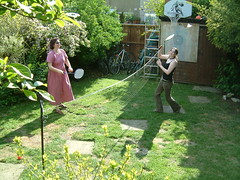Every once in while I'm reminded that no matter how long I live abroad, I'm always going to be American. The latest was during a dinner party with some friends. The conversation turned to Liverpool's unprecedented championship win, where they came back from 3-0 to defeat Madrid. I can only go so far in such conversations. I don't have the cultural background, don't have any relatives in Liverpool (as far as I know) and have no real emotional attachment to the team. I can appreciate a good game, and enjoyed watching it, but that's it.
Then the conversation turned to politics, and Iraq. What do Theresa and I think of "all that," the other guests wanted to know.
I've learned over the years to take positions rarely, and carefully. If opinions come easy, the issue is either drop-dead simple or you don't understand the complexities. I don't think the question of how to make the world safer is drop-dead simple.
I said the U.S. is separated into two, nearly equal camps. One boasts about the fuel efficency and small size of their Prius, the other brags about the dimensions of their Hummer. Neither side talks to the other. Both listen to different radio stations, watch different TV stations and read different newspapers. I didn't actually say what camp I'm in, and as an ex-pat I'm probably in a third one anyway. But the point I was trying to make, but didn't quite, is that people shouldn't judge America from just one side. The views of Americans are broader than you see on the BBC or read in the Daily Mail or the Guardian.
Whether this is a cause for optimism or despair is the question. Despair is more likely. The two halfs of the U.S. are mutually certain of their positions. So much so, that to each their "facts" seem so self-evident, so dead-simple, that they believe the "other side" must be deliberately ignoring them. Both sides assume malice in the other's position. Talking at all about Iraq, or politics in general, is next to impossible now. Ironically, it's easier to have these conversations in a London dining room, or even to random people on Skype, than in the U.S.
But it's getting harder even here. Dan Gillmor writes about spending Memorial Day as a visitor to another country. Check out the comments: The gap between the sides seems insurmountable. Malice assumed.
I'm finding it harder and harder to explain America. The newspapers, here and there, feature the same, tragic stories, often based on the military's own investigations. One Afghan cab driver strayed a little too close to an American base and died horribly, slowly, beaten by U.S. soldiers. Our president dismisses criticism of torture as "absurd," coming from "people who hate America." He's not listening. Malice assumed.
More blogs on similar subjects (via Technorati): United States, Foreign Policy, Iraq, Politics, Guantanamo
Tuesday, May 31, 2005
Use the farm, young cucumber! Use your peelings!
Grocery Store Wars | Join the Organic Rebellion. Silly marketing works.
Monday, May 30, 2005
Everything Bad is Good for you

I like video games, but I'm terrible at them. When I play SimCity, a game that lets use design a city and then try to manage and nurture it, my metropolises quickly evolve into eyesores that depend on money skimmed from crack houses (by the corrupt police force) for their tax revenue. Then they decline. Steven Johnson, in his book "Everything Bad is Good for You: How Popular Culture is Making Us Smarter," argues that I should try harder.
Johnson's book is easily the most optimistic I've read in years. He says today's television shows, films, video games, the Internet and even reality TV aren't in a race to the gutter, as people have been predicting. Instead, the increasing complexity of these diversions are giving our brains a workout.
The effect of this can be seen in the Flynn Effect, named after a researcher who discovered that IQs have been rising at an increasing rate since World War II. The trend wasn't noticed initially because the designers of IQ tests rejig them periodically to ensure that someone of average intelligence rates 100, inadvertantly making the test's more difficult over time. The boost can't be attributed solely to other factors, such as better nutrition or better schools. People have been getting smarter as average height (directly related to nutrition) and school test grades have stagnated or declined.
The few points a decade may not seem like much, but as Johnson points out, it adds up. Someone who scores in the upper 10 percent of the population in 1920, if put in a time machine and given the test again, would be in the bottom third today. Yesterday's geniuses are today's dunces, Johnson says.
On video games, Johnson doesn't argue that Grand Theft Auto or SimCity compare in literary quality to Charles Dickens. What video games offer is a mental challenge: it takes hours of probing, experimenting and juggling of multiple concepts to figure out how to get over that next mountain without getting killed by trolls, or get down a hallway that is blocked by an electrofied puddle of water, or even just to figure out the basic rules. And it isn't the violence that attracts gamers (average age: 29), but complexity. Indeed, the most popular games sound less than thrilling -- kids spend weeks holding down two virtual jobs so that they can support the family of six they've spawned in the Sims., Johnson says. And they enjoy it.
He tells of once spending 15 minutes explaining SimCity to a seven-year-old. The child noticed that the business district wasn't exactly thriving. "I think we need to lower our industrial tax rate," the boy says. How long do you think that child would have stayed awake during a lecture on city planning, Johnson asks?
Even the violent games (and Johnson doesn't deny that many popular games are violent) aren't what they seem to the parent who only glances over occasionally. Kids aren't idiots. They know this is fiction. What keeps them engrossed for the average 40 hours it requires to get through a video game is the puzzles, the mental challenge. They aren't just wasting bad guys, they're getting through the warehouse, to pick up the tools they need to crack the safe in the penthouse, to retrieve the code needed to defuse the bomb, etc. If violent games caused violence, why has overall rates of violent crime dwindled at the same time these games exploded in popularity, Johnson asks? And how does the violence in these games compare with Oedipus, a random chapter of the Old Testiment or Grimm's Fairy Tales?
There's an economic incentive, as well. Games have to be complex enough to keep an intelligent person occupied for weeks and challenging enough to support an ecosystem of Web sites and 200-page game guides. And the bar keeps rising. From Pong, through PacMan through Lord of the Rings. Games developed for millions fail every year because they're too easy.
In television, the trend is similar, but driven by different economic motivations. Successful TV shows make millions selling DVDs and endless serialization on endless channels. They're designed for repeatability, to reward people who put some effort into it, who want to watch it again to see what they missed. In previous decades, you watched an episode of Charlie's Angels or Happy Days once, then had to wait months for the network to rerun the episode during the summer, or years for the episode to appear again in syndication. The episodes had to be simple, three-act plays, with nothing mentally challenging about them.
That began to change with shows such as Hill Street Blues and St. Elsewhere. The dramas used multiple story lines in the same show -- as many as 10 -- and required viewers to do some of the thinking and keep track of dozens of social relationships, sometimes over years. Shows began to use avante garde methods -- an episode of Sienfied got 30 million viewers for one episode that ran the scenes backwards. The punch lines game after the setup. On first viewing, the show was incomprehensible. People had to tape and watch it again to make any sense of it. It remains one of the most popular episodes of Sienfield ever. Similarly, the average episode of the Simpsons, Johnson says, contains dozens of references to film plots, politics and popular culture that emerge over time. And you can watch the show on many levels -- the simple slapstick and then the inside jokes. The Simpsons reward repeated viewings.
In film, the trend has been less evident, partly because viewers must be able to digest it all in two hours. You don't have the luxury of time. But that said, films such as Adaptions and Being John Malkovich also use what avante garde directors would have considered experimental in the 1950s and 60s, Johnson says. Yet they get millions of viewers and sell well on DVD for years. They may not be blockbusters at the box office, but they will almost certainly make more money for their creators over time than many summer smashes. Some, such as Lord of the Rings have been extraordinarily successful with extremely complex plots. The three Rings movies run for over 10 hours in their DVD formats, which are still grossing hundreds of millions. In 2003, DVD sales outstripped box office receipts for the first time, Johnson says.
On the Internet, an explosion of diversions has turned millions into writers, communicators and participants in politics and the community. It's filled with what Johnson calls "lean forward" diversion -- requiring participation from the user -- as opposed to "lean back" technology such as television.
Johnson uses reality TV to show that even if you compare today's average fare with yesterday's average, the trend still holds. The Apprentice is similar to video games in that the rules aren't evident when the game starts -- they change over time, and require a great deal of emotional intelligence on the part of the viewer to keep track of the alliances, strategies and warring camps. Compare that with The Price is Right or Wheel of Fortune.
In the end, Johnson says the overlooked benefits of popular culture aren't enough to replace other, earlier forms of entertainment. He still advocates encouraging children to read, because books allow for an exploration of ideas in depth, something most Web pages don't have room for. But we should worry less when they also spend time instant messaging with their friends or focussed on the PlayStation. If you steer them toward the more demanding fare, you may be doing them a favor.
More blogs on similar subjects (via Technorati): reviews, books, culture,
Link
Sunday, May 29, 2005
Odd Priorities
The Huffington Post | The Blog:
Why not?
Membership Restricted to U.S. Citizens
By JIM FITZGERALD, AP
WHITE PLAINS, N.Y. (May 27) - Everyone agrees that Ligaya Lagman is a Gold Star mother, part of the long line of mournful women whose sons or daughters gave their lives for their country. Her 27-year-old son, Army Staff Sgt. Anthony Lagman, was killed last year in Afghanistan, but American Gold Star Mothers Inc., has rejected Lagman, a Filipino, for membership because - though a permanent resident and a taxpayer - she is not a U.S. citizen.
'There's nothing we can do because that's what our organization says: You have to be an American citizen,' national President Ann Herd said Thursday. 'We can't go changing the rules every time the wind blows.'
Why not?
Saturday, May 28, 2005
Unstoppable
Free Press News : Same as it ever was: "And the most stupefying part of it all is that with every bust, the entertainment industry makes it less and less likely that it will have the upper hand in how it all plays out."
Andrew Leonard at Salon opines on the continuing efforts of the film studios and music companies to kill themselves. It's only a matter of time.
Andrew Leonard at Salon opines on the continuing efforts of the film studios and music companies to kill themselves. It's only a matter of time.
Wednesday, May 25, 2005
I want this
The Nokia - Nokia 770 looks very interesting. We have a wireless network in our house, and almost everything I use on the computer is available with just a Web connection, so I could check my email, browse, etc., using this little device. Nokia could screw this up by making it too pricey, of course. It should be *much* cheaper than an Apple iBook, for example, or I'll just go for the iBook.
Saturday, May 21, 2005
Taking a dip
One of Ailish's shots. We took Dude to Ruislip Lido and tried to get his energy out by throwing sticks as far as we can into the water. He's not a retriever, though. Usually he'd just bring some water back.
Aidan's Confirmation
Aidan was confirmed last night by Bishop George Stack. We don't have any photos of the actual event (our parish priest doesn't allow photography during the service), but here are a few before and after pics.
[Updated to use smaller pictures. Click on any of them to see a larger photo.]
Here's Aidan and I and then the him with his brothers and sisters before the event:
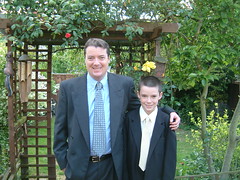
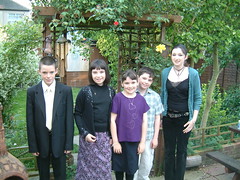
Here he is with Theresa while at dinner later:
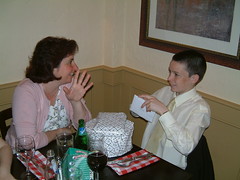
Gail and Michele, two friends of ours, came along to the dinner as well:
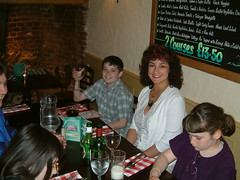
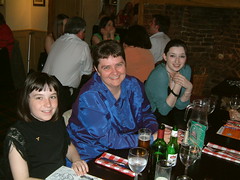
More pictures, as usual, here.
[Updated to use smaller pictures. Click on any of them to see a larger photo.]
Here's Aidan and I and then the him with his brothers and sisters before the event:


Here he is with Theresa while at dinner later:

Gail and Michele, two friends of ours, came along to the dinner as well:


More pictures, as usual, here.
Friday, May 20, 2005
The Best P.R.: Straight Talk - New York Times
The Best P.R.: Straight Talk - New York Times: "The fact that the White House spokesman Scott McClellan spent part of his briefing on Tuesday excoriating Newsweek - and telling its editors that they had a responsibility to 'help repair the damage' to America's standing in the Arab-Muslim world - while not offering a single word of condemnation for those who went out and killed 16 people in Afghanistan in riots linked to a Newsweek report, pretty much explains why we're struggling to win the war of ideas in the Muslim world today. We are spending way too much time debating with ourselves, or playing defense, and way too little time actually looking Arab Muslims in the eye and telling them the truth as we see it."
I might as well point these out while the opinion columns in the New York Times are still free. Thomas Friedman makes an excellent point: The rioting over the Newsweek story last week isn't a natural outcome of Islam. Killing fellow Muslims isn't Islamic. The other side has some issues to deal with too.
I might as well point these out while the opinion columns in the New York Times are still free. Thomas Friedman makes an excellent point: The rioting over the Newsweek story last week isn't a natural outcome of Islam. Killing fellow Muslims isn't Islamic. The other side has some issues to deal with too.
Thursday, May 19, 2005
Walk (or run) to watch
BBC NEWS | Technology | Shoe kick-starts active lifestyle: "The shoe - dubbed Square-eyes - has a unique insole that records the amount of exercise a child does and converts it into television watching time."
Seems like overkill to me. Then again, limiting TV time sometimes just leads to kids sitting around, moaning that they're bored, instead of going outside and doing something else.
Seems like overkill to me. Then again, limiting TV time sometimes just leads to kids sitting around, moaning that they're bored, instead of going outside and doing something else.
Tuesday, May 17, 2005
What a news editor is supposed to do
Jay Rosen at Press Think takes apart the Newsweek debacle to try and figure out what went wrong.
PressThink: Newsweek's Take-Our-Word-For-It World: "Newsweek, which I will call S1 for our first level source, and for which we have names (Michael Isikoff, Mark Whitaker, John Barry) said that it had sources (S2) without names, who in turn said that other sources (S3) also without names, working as investigators for the government, have learned enough from their sources (S4), likewise unnamed, to conclude in a forthcoming report for U.S. Southern Command (finally, a name!) that unnamed interrogators (S5) dumped the Qur’an into toilets to make a point with prisoners (S6) who are Muslims but also not named."
Like I said previously, there but for the grace of God. Our scoops are measured in seconds. Minutes are an eternity. But we also have strict rules in place for using unidentified sources. We can't, unless we get approval from the editor-in-chief.
The danger comes when reporters come running in with a "scoop" and the editor forgets that his or her job is to represent the reader, not the reporter. I could, if I'm not careful or because I'm rooting for the reporter, convince my editors that we have the story. If I succeed on a story this poorly-sourced, I've failed to represent the reader.
If Newsweek had similar rules about using unidentified sources, which I suspect they do, what was the editor-in-chief told?
Technorati Tags: journalism
PressThink: Newsweek's Take-Our-Word-For-It World: "Newsweek, which I will call S1 for our first level source, and for which we have names (Michael Isikoff, Mark Whitaker, John Barry) said that it had sources (S2) without names, who in turn said that other sources (S3) also without names, working as investigators for the government, have learned enough from their sources (S4), likewise unnamed, to conclude in a forthcoming report for U.S. Southern Command (finally, a name!) that unnamed interrogators (S5) dumped the Qur’an into toilets to make a point with prisoners (S6) who are Muslims but also not named."
Like I said previously, there but for the grace of God. Our scoops are measured in seconds. Minutes are an eternity. But we also have strict rules in place for using unidentified sources. We can't, unless we get approval from the editor-in-chief.
The danger comes when reporters come running in with a "scoop" and the editor forgets that his or her job is to represent the reader, not the reporter. I could, if I'm not careful or because I'm rooting for the reporter, convince my editors that we have the story. If I succeed on a story this poorly-sourced, I've failed to represent the reader.
If Newsweek had similar rules about using unidentified sources, which I suspect they do, what was the editor-in-chief told?
Technorati Tags: journalism
The Hockey Goalkeeper from Hell
The New Yorker: The Critics: The Current Cinema: "All movies bear a tint of it, in varying degrees, but it takes a vulgarian genius such as Lucas to create a landscape in which actions can carry vast importance but no discernible meaning, in which style is strangled at birth by design, and in which the intimate and the ironic, not the Sith, are the principal foes to be suppressed."
My favorite film critics are at their best when they really, really hate something. Masterpiece.
My favorite film critics are at their best when they really, really hate something. Masterpiece.
Monday, May 16, 2005
www.AndrewSullivan.com - Daily Dish
www.AndrewSullivan.com - Daily Dish: "The great gift that the New York Times gives the world is free access to its articles, opinion-journalists, and stories. In September, that will no longer be the case. They are putting up a $50 toll-booth to 'the work of Op-Ed columnists and some of the best known voices from the news side of The Times and The International Herald Tribune (IHT).' They'll be charging for the privilege of reading MoDo and Krugman and Brooks. I can understand the economics of this, as newspaper circulation declines. But I wonder if, in the long run, this is a wise move on their part. "
Well, there goes one of my last connections to the U.S. It simply won't be worth it for me to pay for a subscription to the New York Times.
Well, there goes one of my last connections to the U.S. It simply won't be worth it for me to pay for a subscription to the New York Times.
Europe, U.S. differences on computers
Dan Gillmor finds it odd that customers in Europe can buy a "big name" laptop with Linux, while people in the U.S. can't. I think it's because Linux has penetrated further in Europe than elsewhere for a number of reasons.
- Europe has been more accepting of alternatives in the computer industry for at least a decade. The region is the home -- or at least the birthplace -- of many prominent open source projects. Linux came out of Finland, the Web was developed at CERN and many heavily-used computer languages such as Python came via Europe. Whether that's important for the operating system market is another question. OS/2 was big here, too. It flopped.
- Unlike some parts of Asia and South America, Europe is relatively affluent and less likely to pirate Windows and Office. In China, for example, You can buy both Windows XP and Office together on a (pirate) DVD for about a dollar. Why bother with Linux? In Europe, they also want to save money, but legally. In operating systems and applications software, that means open source.
- European governments and businesses seem to be catching on quicker than in the U.S. that the Microsoft tax is taking a bigger and bigger chunk of the computer budget, as hardware costs decline. Maybe it's just pride, but the result is that the most prominent "wins" for Linux lately have been in Europe. The U.K. government estimated that schools could save millions by using open source. The governments of Munich and Paris have also recently decided to go that route, and not just as a bargaining chip with Microsoft.
- Computer spending worldwide isn't growing at the same fast pace, meaning PC makers have to work harder for every percentage point of growth. If U.K., French and German governments and schools are going to use Linux, that's a percentage point that HP and IBM can't just leave to the smaller, national white box (generic) PC makers.
- Laptops in Europe aren't just used by the Powerpoint set (i.e., corporate users that must use Windows and Microsoft Office). In my experience, more consumers buy laptops here than in the U.S. They fit better in the smaller homes. You can put a laptop in a drawer when you're finished with it, or use it at the local cafe. More Americans have a spare room, or just buy both a desktop and a laptop.
The result of all this is more demand for Linux, simple as that. Not much more, mind you, but enough.
Technorati Tags: computers, linux, Europe, windows
- Europe has been more accepting of alternatives in the computer industry for at least a decade. The region is the home -- or at least the birthplace -- of many prominent open source projects. Linux came out of Finland, the Web was developed at CERN and many heavily-used computer languages such as Python came via Europe. Whether that's important for the operating system market is another question. OS/2 was big here, too. It flopped.
- Unlike some parts of Asia and South America, Europe is relatively affluent and less likely to pirate Windows and Office. In China, for example, You can buy both Windows XP and Office together on a (pirate) DVD for about a dollar. Why bother with Linux? In Europe, they also want to save money, but legally. In operating systems and applications software, that means open source.
- European governments and businesses seem to be catching on quicker than in the U.S. that the Microsoft tax is taking a bigger and bigger chunk of the computer budget, as hardware costs decline. Maybe it's just pride, but the result is that the most prominent "wins" for Linux lately have been in Europe. The U.K. government estimated that schools could save millions by using open source. The governments of Munich and Paris have also recently decided to go that route, and not just as a bargaining chip with Microsoft.
- Computer spending worldwide isn't growing at the same fast pace, meaning PC makers have to work harder for every percentage point of growth. If U.K., French and German governments and schools are going to use Linux, that's a percentage point that HP and IBM can't just leave to the smaller, national white box (generic) PC makers.
- Laptops in Europe aren't just used by the Powerpoint set (i.e., corporate users that must use Windows and Microsoft Office). In my experience, more consumers buy laptops here than in the U.S. They fit better in the smaller homes. You can put a laptop in a drawer when you're finished with it, or use it at the local cafe. More Americans have a spare room, or just buy both a desktop and a laptop.
The result of all this is more demand for Linux, simple as that. Not much more, mind you, but enough.
Technorati Tags: computers, linux, Europe, windows
Sunday, May 15, 2005
Spoiled with good weather
We've been spoiled by good weather these last several days. It's only the middle of May and we've already gone through our first bag of charcoal. Here's a picture of Ailish's failed attempt to rush the net in badminton. You can just Theresa's winning shot going over her head.
The non-digital divide
When the subject of "rivers of blood" came up, I had a feeling this wasn't going to be the usual light Skype chat with a stranger.
When I'm sitting at my PC to just browse, and don't have any work to do, I turn on Skype's "Skype Me" mode to indicate that I'm available for chatting. Within a few minutes, I was added to a conference call with some Lithuanian teenagers. They wanted to talk basketball, so they added a random American to the mix. None of them had any problem speaking English, naturally. Unfortunately, they spoke much more fluently about basketball than I could, so I dropped out after about 10 minutes.
The next call was from a graduate student in Morocco. The conversation turned to Iraq. Seeing that I was also Irish, he tried to compare the conflict in Iraq, Palestine and Afghanistan with Northern Ireland. The conflict is about religion, he says. Just as Protestants and Catholics are battling for survival in Northern Ireland, the wars in the Middle East are about Christians trying to destroy Islam or convert Muslims to Christianity. It won't end until every river runs with blood, he says.
I pause. Where to start? Well, let's start with something I do know: The conflict in Northern Ireland has nothing to do with religion. The people saying that are those who want the conflict to continue, because they benefit from the chaos. Thugs on both sides profit from protection rackets. The politicians gain power through fear and hatred, rather than on doing difficult jobs well, such as running schools or getting the rubbish picked up on time. Pretending that the Northern Ireland conflict has anything to do with religion serves only to prolong it and keeps both sides from talking.
I said I don't expect him to believe me right away, but I do hope that something of what I say stays in his heart somewhere. The West, outside of a lunatic fringe, doesn't want to destroy Islam. The conflicts aren't about religion, even in Palestine. And I know just enough about Islam to know that car bombing civilians isn't Islamic, so I doubt the other side is much motivated by religion either. Islam is a thin veneer of respectability on their grab for power.
We ended the conversation with agreement on some basic points: The U.S. could have approached Sept. 11 more effectively. I believe Americans could have skipped Iraq and poured the same amount of money into rebuilding Afghanistan, for example, while he believed the U.S. shouldn't have attacked anyone. He also promised to send me some articles he's written on the conflict, so that I can "edit" them. Hmm... I said I couldn't promise anything, but I'll certainly read them. I haven't seen anything yet.
The chance to have conversations with a random Muslims probably won't convince more of my family and friends to use Skype (count so far: zero), but it probably should. The world would be a slightly better place if more of these meetings happened.
Technorati Tags: Iraq, religion, war, Palestine, skype, Islam, Christianity, terrorism
[Updated May 16 at 20:38 to fix a typo.]
When I'm sitting at my PC to just browse, and don't have any work to do, I turn on Skype's "Skype Me" mode to indicate that I'm available for chatting. Within a few minutes, I was added to a conference call with some Lithuanian teenagers. They wanted to talk basketball, so they added a random American to the mix. None of them had any problem speaking English, naturally. Unfortunately, they spoke much more fluently about basketball than I could, so I dropped out after about 10 minutes.
The next call was from a graduate student in Morocco. The conversation turned to Iraq. Seeing that I was also Irish, he tried to compare the conflict in Iraq, Palestine and Afghanistan with Northern Ireland. The conflict is about religion, he says. Just as Protestants and Catholics are battling for survival in Northern Ireland, the wars in the Middle East are about Christians trying to destroy Islam or convert Muslims to Christianity. It won't end until every river runs with blood, he says.
I pause. Where to start? Well, let's start with something I do know: The conflict in Northern Ireland has nothing to do with religion. The people saying that are those who want the conflict to continue, because they benefit from the chaos. Thugs on both sides profit from protection rackets. The politicians gain power through fear and hatred, rather than on doing difficult jobs well, such as running schools or getting the rubbish picked up on time. Pretending that the Northern Ireland conflict has anything to do with religion serves only to prolong it and keeps both sides from talking.
I said I don't expect him to believe me right away, but I do hope that something of what I say stays in his heart somewhere. The West, outside of a lunatic fringe, doesn't want to destroy Islam. The conflicts aren't about religion, even in Palestine. And I know just enough about Islam to know that car bombing civilians isn't Islamic, so I doubt the other side is much motivated by religion either. Islam is a thin veneer of respectability on their grab for power.
We ended the conversation with agreement on some basic points: The U.S. could have approached Sept. 11 more effectively. I believe Americans could have skipped Iraq and poured the same amount of money into rebuilding Afghanistan, for example, while he believed the U.S. shouldn't have attacked anyone. He also promised to send me some articles he's written on the conflict, so that I can "edit" them. Hmm... I said I couldn't promise anything, but I'll certainly read them. I haven't seen anything yet.
The chance to have conversations with a random Muslims probably won't convince more of my family and friends to use Skype (count so far: zero), but it probably should. The world would be a slightly better place if more of these meetings happened.
Technorati Tags: Iraq, religion, war, Palestine, skype, Islam, Christianity, terrorism
[Updated May 16 at 20:38 to fix a typo.]
Saturday, May 14, 2005
A walk in the woods
Nothing but the sound of birds chirping, and my dog crashing through the underbrush after God-knows-what. It looks peaceful, anyway.
Dan Gillmor's new blog
Dan Gillmor's citizen journalism idea is getting its first try out in a community site for Silicon Valley called Bayosphere. I'll be watching with interest, even from about 6,000 miles away, just to see how it works. I'd love something like that in London.
What would a London version of this kind of site look like? How different would it have to be? Is there an audience?
What struck me most about the local journalism when I first moved here was that there is very little of it. You have the free, ad-supported newspapers that no one really reads (the articles seem designed just to fill the spaces between the ads) and then the national media. The local BBC broadcasts provide some news communities can use, but not much.
There was a huge fire in our neighborhood a couple of years ago. We could hear the roar from about a mile away, it woke us up. Coverage? It got mentioned once on the BBC -- during the traffic report. As for what happens in local government -- such as it is -- I hear almost nothing.
Compared with the U.S., there's a bigger gap here between the elite, national media (who mostly talk to each other) and the local community. A site like this would fill that gap nicely.
[Updated to correct the distance between the bay area and London.]
Technorati Tags: journalism, press, community, blog
Link
I've moved my blog to Bayosphere, where I'll report and comment on the Silicon Valley technology community -- and a whole lot more including my observations about the burgeoning arena that's variously called citizen journalism, personal publishing, grassroots media and a lot of other things. They all have something in common: the read-write Web.
What would a London version of this kind of site look like? How different would it have to be? Is there an audience?
What struck me most about the local journalism when I first moved here was that there is very little of it. You have the free, ad-supported newspapers that no one really reads (the articles seem designed just to fill the spaces between the ads) and then the national media. The local BBC broadcasts provide some news communities can use, but not much.
There was a huge fire in our neighborhood a couple of years ago. We could hear the roar from about a mile away, it woke us up. Coverage? It got mentioned once on the BBC -- during the traffic report. As for what happens in local government -- such as it is -- I hear almost nothing.
Compared with the U.S., there's a bigger gap here between the elite, national media (who mostly talk to each other) and the local community. A site like this would fill that gap nicely.
[Updated to correct the distance between the bay area and London.]
Technorati Tags: journalism, press, community, blog
Link
Friday, May 13, 2005
Buddha

At the birth of Siddhatta Gotama, as Buddha was known before he reached enlightenment, Karen Armstrong says his father was told a prophecy. His son would be a great emperor, with tremendous worldly power and a huge army, unless he sees four things: a sick man, a corpse, an old man suffering senility and a monk, one of the wandering mystics "Going Forth" to discover the true meaning of life. His father, a wealthy man with a large palace, wanted worldly power for Gotama, so he tried to ensure that his son never witnesses suffering of any kind and kept him sheltered at home.
It didn't work. The gods intervened, ensuring that Gotama saw all three. At 29, he left his wife, child and a comfortable life to find life's meaning.
Armstrong is up-front on the difficulties of trying to do a biography of Buddha. Unlike Muhammad and Jesus, we know very little about Buddha's ministry. There's very little in the way of personal anecdotes, or even a recognizable personality. Buddha appears as a type, a personification of a teaching.
The differences in the culture of India at the time is also a handicap to understanding Buddhism. Few in the West understand that reincarnation was not looked at as a good thing, Armstrong says. It meant you had to struggle, age, sicken and die over and over again. Even if you amassed massive amounts of karma and became a god, it was still only temporary. After lording it over mortals for a while, you'd still die -- and then probably come back as a slug or a louse.
What people were looking for was a release, to end the cycle. Gotama was one of many trying to discover how to accomplish this.
Still, the similarities between Buddhism and the other so-called Axial Age religions and philosophies are striking. Buddha, Confucius, Zoroaster and the Hebrew prophets preached similar ideas, around the same time.
"He who sees me sees the Dhamma (teaching) and he who sees the Dhamma sees me,'' Armstrong quotes the Buddha as saying.
Sound familiar? Jesus said, "He who sees the Father sees me and he who sees me sees the Father." No wonder some believe Jesus took a side trip to India in his first 30 years.
Other similarities are more well-known: All of the major world religions teach the need to give up the ego and selfishness and replace it with compassion, because that's what makes us human. The Golden Rule is common to all the major religions.
There are, of course, differences. To the Buddha, whether God existed was almost irrelevant. He believed any effort to personify the divine presence was a distraction that would hold people back from reaching enlightenment. The divine was simply incomprehensible in any rational way, and trying to pretend otherwise meant you weren't truly giving up your ego. Muslims and Jews banned images of God for similar reasons. Christians, on the other hand, believe God took human form.
Buddhism is also a practical religion, Armstrong says: Buddhism is true, they believe, because it works. Shedding the ego, practicing meditation and developing compassion and empathy with others, makes you happier. Therefore, it's correct.
Armstrong goes into enough detail of Buddha's eventual answer to get a flavor: He built on what went before, becoming very adept at yoga, for example. The secret ingredient was compassion and empathy, reaching out with loving-kindness to every living thing, at a depth that could only be attained when all ego, all self, was left behind.
He was a new kind of human being: no longer caught in the toils of greed and hatred, he had learned to manipulate his psyche in order to live without egotism. He was still living in the world, but inhabited another sacred dimension, too, which monotheists would call the divine presence.
The ultimate Buddhist way of measuring success is to examine the result: Buddha may not have become the powerful emperor that his father had hoped, but the community he started is still going strong, 2,500 years later. None of the empires in his day are still around. The father's attempt to protect his son by sheltering him backfired, but it created something much more lasting.
"The message seems to be that it is not by protecting and defending yourself that you survive, but by giving yourself away."
Technorati Tags: bookreview, religion, buddhism, buddha, books
Link
That explains it
The New York Times, in an op-ed titled The Tipping Point, states what most of us already know from experience. Prominent public people, especially chief executives or high-level politicians, are just this side of nuts, or prison. We've had several executives recently on trial for stepping over that line, and not a few politicians too.
A 2001 study found that mental patients, prison inmates and business executives shared many traits, according to the article. However, there were some differences:
Link
There has been anecdotal and case-study evidence suggesting that successful business executives share personality characteristics with psychopaths. The question is, are the characteristics that make up personality disorders fundamentally different from the characteristics of extreme personalities we see in everyday life, or do they differ only in degree?
A 2001 study found that mental patients, prison inmates and business executives shared many traits, according to the article. However, there were some differences:
The executives were significantly more likely to demonstrate characteristics associated with histrionic personality disorder, like superficial charm, insincerity, egocentricity and manipulativeness. They were also significantly less likely to demonstrate physical aggression, irresponsibility with work and finances, lack of remorse and impulsiveness.
Link
Too fast?
BBC NEWS | World | Europe | Pope John Paul II to be beatified
OK, yes, he was a good pope, but I always worry a bit when people feel the urge to rush. That concern is probably a sign that I'm getting old.
Technorati Tags: pope, religion
The Pope waived the usual rules which require a five-year wait before the Church begins to make someone a saint.
OK, yes, he was a good pope, but I always worry a bit when people feel the urge to rush. That concern is probably a sign that I'm getting old.
Technorati Tags: pope, religion
Is the BBC the only news provider who can do this?
The British Broadcasting Corporation, the mostly state-funded broadcaster in the U.K., is jumping into the future with both feet lately. Its newest project is something called Backstage, where they actively encourage readers and developers to take their content, mix it up and share it. One result so far is a site that adds links to Wikipedia and blogs about the news story. See this story on Malcolm Glazer's purchase of Manchester United, for example. There are links to articles about the football team that aren't in the original story, and there's a new item down the right side listing Web pages that have commented on the news.
Here's the blog entry describing the project, called WikiProxy.
Technorati Tags: content, bbc, wiki, commons
Here's the blog entry describing the project, called WikiProxy.
Technorati Tags: content, bbc, wiki, commons
Thursday, May 12, 2005
del.icio.us has a blog
The del.icio.us Web site is, with the possible exception of gmail, the most useful service on the Internet. Now the developers have a blog.
Hiring is Obsolete
Paul Graham says hiring is obsolete and undergraduates are undervalued. They should start companies instead.
But what if you were like me in your early 20s -- a liberal arts major with a family? I think I made the right choices in life. At the end of the 1980s, journalism was interesting, broadening and basically unlimited. You have to wonder, though: If I put as much work into a business pursuit as I did into reporting and editing, would I have been richer? Probably. The one talent I have had over the years is spotting the cool stuff fairly early on. I was running a Web site on Linux in 1993, for example. Would I have been happier? Not likely.
But what if you were like me in your early 20s -- a liberal arts major with a family? I think I made the right choices in life. At the end of the 1980s, journalism was interesting, broadening and basically unlimited. You have to wonder, though: If I put as much work into a business pursuit as I did into reporting and editing, would I have been richer? Probably. The one talent I have had over the years is spotting the cool stuff fairly early on. I was running a Web site on Linux in 1993, for example. Would I have been happier? Not likely.
Bloglines down
The downside of living through Web services is that this happens once in a while. I would have said it happens rarely just a week ago, but Gmail also went down on me recently. Oh, oh.
Link
Link
Wednesday, May 11, 2005
Act Like Me
Kurt Vonnegut's idea for a letter from Uncle Sam to Iraq (via Paul Krassner's blog on the Huffington Post).
You can also add: civil war is OK, but just once. Fundamentalists should be allowed to participate in government, but only at the highest levels. Oh, and oil should be your main foreign policy concern.
It sounds like Iraq is coming along just fine.
Link
Dearest Iraq: Act like me. After 100 years of democracy, let your slaves go. After 150, let your women vote. At the start of democracy, ethnic cleansing is quite OK. Love you madly! Uncle Sam
You can also add: civil war is OK, but just once. Fundamentalists should be allowed to participate in government, but only at the highest levels. Oh, and oil should be your main foreign policy concern.
It sounds like Iraq is coming along just fine.
Link
Skype Hype
David Berlind does a good job of listing the remaining glitches with Skype. (Disclosure: He used to be my boss many moons ago.) I still can't get anyone in my family to use it, so I've been mostly using the SkypeOut feature. It works fine 95 percent of the time, but I tend to get "drop outs" at the worst times, such as when I called my mother recently to wish her a happy birthday. That was during peak time in the U.S., so that's probably part of the problem. I've thought of buying a SkypeIN number, but I'm not convinced I can make it pay. No one calls me on plain-old telephone lines, either...
What I'm more concerned about is compatibility with other VoIP standards. When will Skype do a SIP gateway, for example? That could be accomplished (maybe as an another add-on service) without jeapordizing Skype's ability to "just work." The downside, of course, is that such gateways would introduce a whole new set of security concerns.
What I'm more concerned about is compatibility with other VoIP standards. When will Skype do a SIP gateway, for example? That could be accomplished (maybe as an another add-on service) without jeapordizing Skype's ability to "just work." The downside, of course, is that such gateways would introduce a whole new set of security concerns.
Tuesday, May 10, 2005
City versus country
I've always wanted to live in either the center of a big city or way out in the country. I've lived most of my life in neither. I grew up in New York City, but in Queens, and today we live in a similar outer borough of London. In between, we've lived in a distant suburb of Boston (Acton) and some fairly rural areas of New Hampshire and Vermont. Which of those locations do you think would be better if you're trying to minimize your impact on the environment, or even just live more efficiently?
In our experience, the city is a better choice by a long shot. We drive far less, walk more and the munipical infrastructure we use (utilities, shops, schools) are considerably more efficient, at least a per-person basis. It's not that clear cut, of course. In Acton, we lived in an apartment building, but we had to drive a lot more and the local shops had to come with equipped with bigger parking lots. Here, we live in a bigger house, but I drive only on weekends. The longest trip I've taken in many months is 19 miles.
Toby Hemenway in his article, Rural versus Urban Sustainability has come to a similar conclusion after spending more than a decade in the country and then moving to Portland.
"I can’t help comparing this neighborhood to our old one," he write. "There, we were twelve families on two miles of road, driveways hundreds of feet long, all served by long runs of phone and electric wire, individual septic systems and wells, each commuting long distances. And with political and social views so divergent that feuds, gossip, and awkward conversations about safe topics were the norm. In the city, an equal group of twelve families use 10% of the road, wire, and pipe needed in my old neighborhood. Many neighbors bus or bike to work, or at worst, drive single-digit mileages."
Part of the problem, he says, is that the people living in the country have changed:
I still want my house by the sea, though. How can I have that and keep from living my life in the car?
Link
In our experience, the city is a better choice by a long shot. We drive far less, walk more and the munipical infrastructure we use (utilities, shops, schools) are considerably more efficient, at least a per-person basis. It's not that clear cut, of course. In Acton, we lived in an apartment building, but we had to drive a lot more and the local shops had to come with equipped with bigger parking lots. Here, we live in a bigger house, but I drive only on weekends. The longest trip I've taken in many months is 19 miles.
Toby Hemenway in his article, Rural versus Urban Sustainability has come to a similar conclusion after spending more than a decade in the country and then moving to Portland.
"I can’t help comparing this neighborhood to our old one," he write. "There, we were twelve families on two miles of road, driveways hundreds of feet long, all served by long runs of phone and electric wire, individual septic systems and wells, each commuting long distances. And with political and social views so divergent that feuds, gossip, and awkward conversations about safe topics were the norm. In the city, an equal group of twelve families use 10% of the road, wire, and pipe needed in my old neighborhood. Many neighbors bus or bike to work, or at worst, drive single-digit mileages."
Part of the problem, he says, is that the people living in the country have changed:
Over the last two decades, millions of people have moved out of cities. Many of them are people of modest means, driven out by the high costs of urban life. Unfortunately, they have brought their city ways with them. Our neighbors in the country all clearcut their land and planted acres of grass. Many built enormous houses, since low interest rates made more square footage affordable. Some put up glaring streetlights in their front yards. They bought boats, ATVs, RVs, and other gas-guzzling toys. Unlike earlier self-reliant country folk, these are simply city people with really big yards. And there are millions of them.
I still want my house by the sea, though. How can I have that and keep from living my life in the car?
Link
The Biggest Conspiracy?
It's interesting that there are still debates about the last presidential election in the U.S. This Huffington Post argues that the election was stolen in a massive conspiracy. The likelihood of this is extremely low, and basing this view on the accuracy of bookmakers seems more than a tad tenious. Long shots do win sometimes. And just in casual watching of elections, you can find plenty of examples of exit polls being wrong. I think it's much more likely that Bush squeaked in, fair and square.
Monday, May 09, 2005
Sand Sculptures
It's always amazing to me to see the effort people will put into artwork that gets washed away in the next tide. Here, via Boing Boing, are some pictures of Sand Sculptures at essays & effluvia. And here's a second set.
Sunday, May 08, 2005
Birthdays
More pics. It's Theresa's birthday, but since I'm only two days later (and three years earlier), we tend to celebrate on the same day.
Kathy came over. First, some snacks and hanging around outside in the garden:
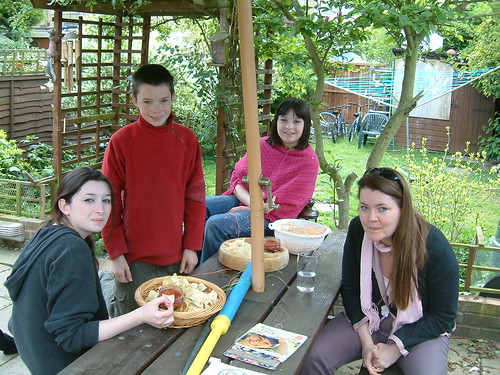


While Theresa is, where else, working inside to prepare our dinner:

Then a game of Trivial Pursuit in the aptly named Sun Room.
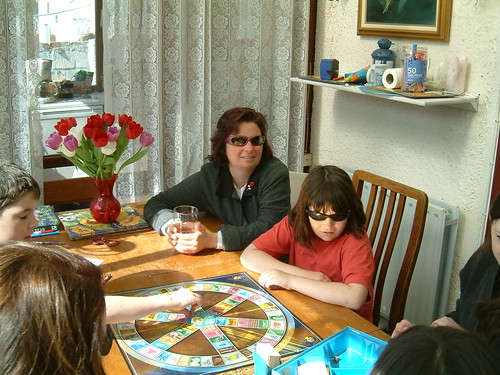
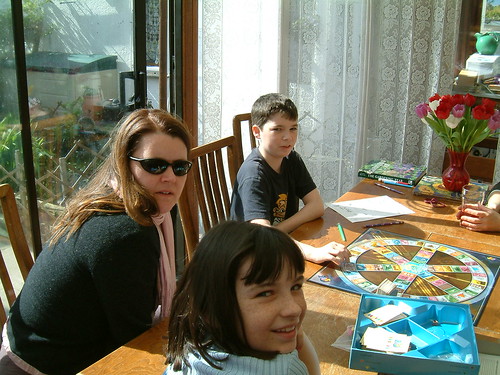
Kathy supplied the pink champagne, the Farr family (the last pics from yesterday) provided the flowers and Theresa provided the Shepard's Pie.

The birthday girl making the most of it:

Theresa and I just as we're about to prove that even old people can blow out candles:
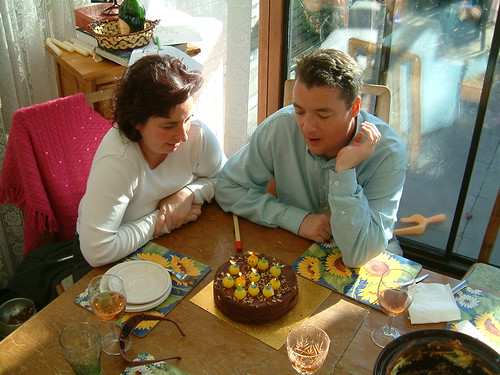
Here we are catching our breath:
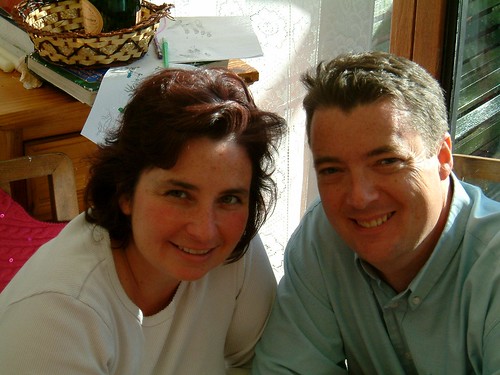
The whole set of pictures is available online.
Link
Kathy came over. First, some snacks and hanging around outside in the garden:



While Theresa is, where else, working inside to prepare our dinner:

Then a game of Trivial Pursuit in the aptly named Sun Room.


Kathy supplied the pink champagne, the Farr family (the last pics from yesterday) provided the flowers and Theresa provided the Shepard's Pie.

The birthday girl making the most of it:

Theresa and I just as we're about to prove that even old people can blow out candles:

Here we are catching our breath:

The whole set of pictures is available online.
Link
Saturday, May 07, 2005
A random Saturday in May
Here are a few pictures from what was a very typical Saturday lately. Theresa worked overnight, so she didn't join us until later.
9:17 a.m.: We brought Aidan, Cara and Shana to baseball and softball games in High Wycombe. Ailish, Liam and I then took the dog for a walk in a large reserve nearby.

9:20 a.m.:

9:53 a.m.:

10:32 a.m.: We've been running out of room in the car, so we stuck Liam in boot:

11:05 a.m.: Cara scores!

11:31 a.m.: A view of the playing fields. Aidan's game is going on in the foreground, while Cara and Shana are playing off in the distance.

12:12 p.m.: Games over. We're heading home.

2:41 p.m.: Some friends drop by:
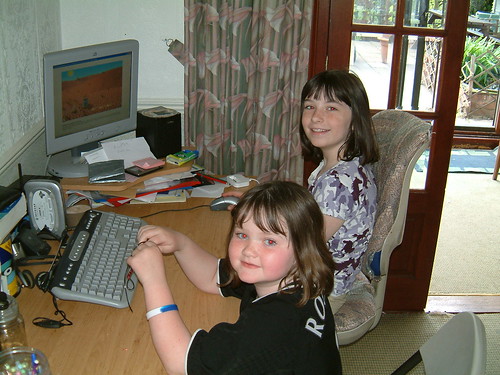
2:43 p.m.: Theresa arises. First thing she reaches for, of course, is coffee:

9:17 p.m.: More friends. The girls are occupied with some arts and crafts project:
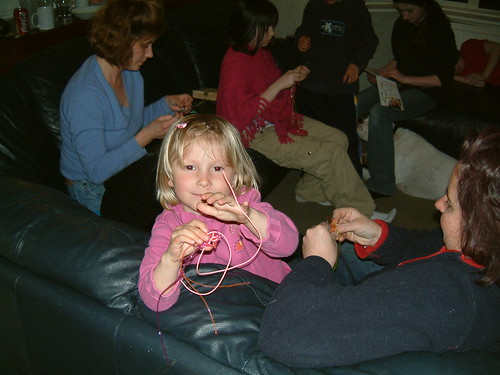
You can also view the whole set of pictures from today.
Link
9:17 a.m.: We brought Aidan, Cara and Shana to baseball and softball games in High Wycombe. Ailish, Liam and I then took the dog for a walk in a large reserve nearby.

9:20 a.m.:

9:53 a.m.:

10:32 a.m.: We've been running out of room in the car, so we stuck Liam in boot:

11:05 a.m.: Cara scores!

11:31 a.m.: A view of the playing fields. Aidan's game is going on in the foreground, while Cara and Shana are playing off in the distance.

12:12 p.m.: Games over. We're heading home.

2:41 p.m.: Some friends drop by:

2:43 p.m.: Theresa arises. First thing she reaches for, of course, is coffee:

9:17 p.m.: More friends. The girls are occupied with some arts and crafts project:

You can also view the whole set of pictures from today.
Link
Seth's Blog: The New Digital Divide
Seth's Blog: The New Digital Divide: "I think a new divide has opened up, one that is based far more on choice than on circumstance."
I'd add a couple more to Seth's:
I'd add a couple more to Seth's:
| The Digerati | The Left Behind |
|---|---|
| Uses del.ico.us | Thinks that's probably a p0rn site. |
| Uses Bittorrent | Uses a VCR |
Friday, May 06, 2005
Tell-a-friend-about-blogs week
I suspect my contribution to Seth Godin's tell-a-friend-about-blogs week will have as much effect as my tell-a-friend-about Skype (no one I know calls me or uses it) and Ubuntu (ditto), but here goes anyway. Here's a list of what he considers his most compelling blog posts since the beginning of the year.
My favorites are scattered about on this blog, and they're generally just pointers to others.
My favorites are scattered about on this blog, and they're generally just pointers to others.
CNN Blog spam Google conspiracy theory
Flash news: Silly Conspiracy Theory Races Through the Internet.
Like that's never happened before. Unfortunately, this one gained credence because some professional journalists wrote it up, without engaging brain. This is an excellent time to look up the term "Occam's Razor."
See Seth Finkelstein's sane take on this:
Like that's never happened before. Unfortunately, this one gained credence because some professional journalists wrote it up, without engaging brain. This is an excellent time to look up the term "Occam's Razor."
See Seth Finkelstein's sane take on this:
The net is filled with people who go around and spam blogs to get their message heard, with various degrees of skill at it. So by the saying "When you hear hoofbeats, think of horses before zebras", when you see weird spam, think marginal people before elaborate PR campaigns. It's a much better fit.
USA Today Reporter Quits Over Lifting Quotations - New York Times
USA Today Reporter Quits Over Lifting Quotations - New York Times: "'It really surprises me, because the gain is so minimal compared to the risk, and the penalty is severe,' Mr. Foreman said. 'It's a life sentence.'"
Thursday, May 05, 2005
Islam: A Short History
I just read a good book: Karen Armstrong's Islam: A Short History. It's not new; I just happened to stumble over it while dropping off a relative at Heathrow.
Here's a random, and by no means complete, list of things that struck me while reading:
- Muhammad was excited about working closely with Jews at the beginning, even scheduling the services at the Mosque to not clash with preparations for the Jewish Sabbath. It was only later that Muhammad had his followers pray toward Mecca instead of Jerusalem, and it wasn't until the 20th century, after the creation of Israel, that anti-Semitism became a real movement among Muslims. It was a prejudice they had to learn from the West.
- The similarity between the sudden explosion of the Arabs into a powerful force in the world to the just-as-sudden explosion of a backward group of tribes in Northern Europe (i.e., us). They came out of nowhere, and so did we, completely taking the then dominant civilizations by surprise.
- The sensitivity of Muslims to politics and the condition of the ummah -- the community of Muslims. The Quran teaches that following God's word and being faithful leads to health, happiness, etc. When Muslims are under pressure, it leads some to feel that the ummah must not be living up to God's word.
- The fundamental difference between Muslims and Christians:
Basically, if you followed the five pillars -- believed that `There is no God but Allah, and Muhammad is his prophet,' pray five times daily, pay alms, fast during Ramadan and (if you can) make the hajj once in your lifetime -- you're a Muslim. ``Anybody who remained faithful to the Pillars was a true Muslim, whatever his or her beliefs.''
- That the religion (given the above) is at its heart individualistic, and designed to be tolerant of many ways to God. For example, the initial military expansion of Islam had very little to do with the religion and subjects were not required, or even encouraged, to convert. The expansion came more from Arab culture, which was violent for centuries, and as a way to keep the ummah together and focused on something other than killing each other in traditional vendettas. Raiding your neighbors is what you did to survive in the desert. The Quran taught them that every Muslim was their neighbor. Hence, they had to go further.
- Ms Armstrong also looks at the formation of fundamentalists, but in a broader way than I've seen elsewhere. Fundamentalism is common across almost all religions, and in fact began in the U.S. in the late 19th and early 20th century. It's a reaction to modernity, when people feel they've been left behind or are being forced to give up their beliefs or culture. In almost all cases, the religion is distorted and made into its opposite -- intolerance and hatred. To believe Islam is fundamentally violent is the same as believing Christianity is fundamentally racists because of the Ku Klux Klan.
- She discusses the mistakes, blunders, missed opportunities and the distortions of Islam from within that turned an initial welcoming of Western ideas among Muslims into a defensive stance. And as the West grew stronger, the Muslim empires fell further and further behind:
And the West spent these years basically occupied with killing each other, in more and more horrific wars, pogroms, terrible government and economics experiments and much angst. Why would we expect the Islamic world to be any better at this transformation?
- She finds some positives in recent developments in some Muslim countries. For example, women who are highly educated and in professional jobs are wearing the traditional clothes not because they are required to, but as a way to bring their culture to the modern world -- to meet it half way. The Muslim world is adapting with the West, in fits and starts, on its own terms.
- The final chapter was written after the Sept. 11 attacks and notes that the trend toward such an attack, and the ideology that spawned it, was brewing for many years. But reconciliation is also brewing.
Next up is her book on Buddha. At least I'm using my three hours on the tube everyday productively.
Here's a random, and by no means complete, list of things that struck me while reading:
- Muhammad was excited about working closely with Jews at the beginning, even scheduling the services at the Mosque to not clash with preparations for the Jewish Sabbath. It was only later that Muhammad had his followers pray toward Mecca instead of Jerusalem, and it wasn't until the 20th century, after the creation of Israel, that anti-Semitism became a real movement among Muslims. It was a prejudice they had to learn from the West.
Muhammad never asked Jews or Christians to accept Islam, unless they particularly wished to do so, because they had received perfectly valid revelations of their own. The Quran insists strongly that 'there shall be no coercion in matters of faith,' and commands Muslims to respect the beliefs of Jews and Christians, whom the Quran calls ahl al-kitab, a phrase usually translated 'People of the Book' but which is more accurately rendered: 'people of an earlier revelation.'
- The similarity between the sudden explosion of the Arabs into a powerful force in the world to the just-as-sudden explosion of a backward group of tribes in Northern Europe (i.e., us). They came out of nowhere, and so did we, completely taking the then dominant civilizations by surprise.
- The sensitivity of Muslims to politics and the condition of the ummah -- the community of Muslims. The Quran teaches that following God's word and being faithful leads to health, happiness, etc. When Muslims are under pressure, it leads some to feel that the ummah must not be living up to God's word.
- The fundamental difference between Muslims and Christians:
It must also be recalled that beliefs and doctrines are not as important in Islam as they are in Christianity. Like Judaism, Islam is a religion that requires people to live in a certain way, rather than to accept certain credal propositions. It stresses orthopraxy rather than orthodoxy.
Basically, if you followed the five pillars -- believed that `There is no God but Allah, and Muhammad is his prophet,' pray five times daily, pay alms, fast during Ramadan and (if you can) make the hajj once in your lifetime -- you're a Muslim. ``Anybody who remained faithful to the Pillars was a true Muslim, whatever his or her beliefs.''
- That the religion (given the above) is at its heart individualistic, and designed to be tolerant of many ways to God. For example, the initial military expansion of Islam had very little to do with the religion and subjects were not required, or even encouraged, to convert. The expansion came more from Arab culture, which was violent for centuries, and as a way to keep the ummah together and focused on something other than killing each other in traditional vendettas. Raiding your neighbors is what you did to survive in the desert. The Quran taught them that every Muslim was their neighbor. Hence, they had to go further.
- Ms Armstrong also looks at the formation of fundamentalists, but in a broader way than I've seen elsewhere. Fundamentalism is common across almost all religions, and in fact began in the U.S. in the late 19th and early 20th century. It's a reaction to modernity, when people feel they've been left behind or are being forced to give up their beliefs or culture. In almost all cases, the religion is distorted and made into its opposite -- intolerance and hatred. To believe Islam is fundamentally violent is the same as believing Christianity is fundamentally racists because of the Ku Klux Klan.
- She discusses the mistakes, blunders, missed opportunities and the distortions of Islam from within that turned an initial welcoming of Western ideas among Muslims into a defensive stance. And as the West grew stronger, the Muslim empires fell further and further behind:
To beat Europe at its own game, a conventional agrarian society would have to transform itself from top to bottom, and recreate its entire social, economic, educational, religious, spiritual, political and intellectual structures. And they would have to do this very quickly, an impossible task, since it had taken the West almost three hundred years to achieve this development.
And the West spent these years basically occupied with killing each other, in more and more horrific wars, pogroms, terrible government and economics experiments and much angst. Why would we expect the Islamic world to be any better at this transformation?
- She finds some positives in recent developments in some Muslim countries. For example, women who are highly educated and in professional jobs are wearing the traditional clothes not because they are required to, but as a way to bring their culture to the modern world -- to meet it half way. The Muslim world is adapting with the West, in fits and starts, on its own terms.
- The final chapter was written after the Sept. 11 attacks and notes that the trend toward such an attack, and the ideology that spawned it, was brewing for many years. But reconciliation is also brewing.
To cultivate a distorted image of Islam, to see it as inherently the enemy of democracy and decent values, and to revert to the bigoted views of the medieval Crusaders would be a catastrophe. Not only will such an approach antagonize the 1.2 billion Muslims with whom we share the world, but it will also violate the disinterested love of truth and the respect for the sacred rights of others that characterize both Islam and Western society at their best.
Next up is her book on Buddha. At least I'm using my three hours on the tube everyday productively.
Dan Gillmor on Operating Systems and Recent History
I agree with Dan Gillmor's FT column on the operating system wars that the Mac OS X is now clearly in front. But I think you have to reach further back into history to analyze the situation in today's market.
Superiority has never been a factor in the OS wars. Applications were, and Microsoft did a better job of wooing the developers. The software more people wanted to run was usually on Windows and not on OS/2 or the Macintosh.
Applications are still king, but there's now a different list of applications-that-matter. The Web browser has been the most important for a long time, but application developers are just getting the hang of creating really compelling software for it. Gmail is one of the best email clients available, and it runs on any operating system with a modern browser. Other earth-shaking applications such as Skype, several varieties of blog readers and Flickr (for photos) are also almost equally useable on Windows, the Mac and Linux. Word processors, spreadsheets and presentation software are still very important, but Microsoft Office runs on both the Mac and Windows acceptably. Even Linux users can use Office-compatible applications that are free and perfectly useable for 90-95 percent of users. The best photo and video editors and music recording software aren't on Windows. Where Microsoft remains in front is on games, but serious gamers use dedicated machines, like the Playstation.
So what's left to distinquish the operating systems? Stability, useability and security. At the moment, on any one of those criteria, Windows is second at best. Microsoft beats the best of the Linux setups in useability, though distributions such as Ubuntu are incredibly close. On stability, the latest version of Windows XP isn't bad, but it still builds up cruft, slows down dramatically over time and takes entirely too much time and effort for maintenance. On security, I don't think the gap is as wide as many people seem to believe, but for Grandma or the average computer-phobic users who just wants to read email and do their homework, OS X and Linux are clearly and strikingly ahead. If you're going to put a Windows computer on a broadband connection, you better really understand what a firewall is and how to work it. Otherwise, get a Mac, or if you can't afford one, get a college student to set up a Linux PC for you. Please.
I also agree with Dan that Microsoft works best when it feels under pressure. But what does it really have that others don't? Its size isn't as much of a factor anymore. Linux and even OS X (which is based on an open-source operating system at its core) has thousands of developers behind it.
Ironically, Microsoft is now on the other side of a battle fought decades ago, when manufacturers of mainframes, unix servers and minicomputers hoped to keep the personal computer at bay by counting on the reluctance of companies to migrate software from one type of computer to another. And look what happened then.
Update: Forbes has done a good story on the problem Microsoft faces.
Superiority has never been a factor in the OS wars. Applications were, and Microsoft did a better job of wooing the developers. The software more people wanted to run was usually on Windows and not on OS/2 or the Macintosh.
Applications are still king, but there's now a different list of applications-that-matter. The Web browser has been the most important for a long time, but application developers are just getting the hang of creating really compelling software for it. Gmail is one of the best email clients available, and it runs on any operating system with a modern browser. Other earth-shaking applications such as Skype, several varieties of blog readers and Flickr (for photos) are also almost equally useable on Windows, the Mac and Linux. Word processors, spreadsheets and presentation software are still very important, but Microsoft Office runs on both the Mac and Windows acceptably. Even Linux users can use Office-compatible applications that are free and perfectly useable for 90-95 percent of users. The best photo and video editors and music recording software aren't on Windows. Where Microsoft remains in front is on games, but serious gamers use dedicated machines, like the Playstation.
So what's left to distinquish the operating systems? Stability, useability and security. At the moment, on any one of those criteria, Windows is second at best. Microsoft beats the best of the Linux setups in useability, though distributions such as Ubuntu are incredibly close. On stability, the latest version of Windows XP isn't bad, but it still builds up cruft, slows down dramatically over time and takes entirely too much time and effort for maintenance. On security, I don't think the gap is as wide as many people seem to believe, but for Grandma or the average computer-phobic users who just wants to read email and do their homework, OS X and Linux are clearly and strikingly ahead. If you're going to put a Windows computer on a broadband connection, you better really understand what a firewall is and how to work it. Otherwise, get a Mac, or if you can't afford one, get a college student to set up a Linux PC for you. Please.
I also agree with Dan that Microsoft works best when it feels under pressure. But what does it really have that others don't? Its size isn't as much of a factor anymore. Linux and even OS X (which is based on an open-source operating system at its core) has thousands of developers behind it.
Ironically, Microsoft is now on the other side of a battle fought decades ago, when manufacturers of mainframes, unix servers and minicomputers hoped to keep the personal computer at bay by counting on the reluctance of companies to migrate software from one type of computer to another. And look what happened then.
Update: Forbes has done a good story on the problem Microsoft faces.
Tuesday, May 03, 2005
Walsingham
The three youngest spent Bank Holiday Monday on a day trip for altar servers. Walsingham is some sort of shrine, but I don't know much more. Theresa would be better informed. Here are Cara, Shana and Liam with a friend of theirs.
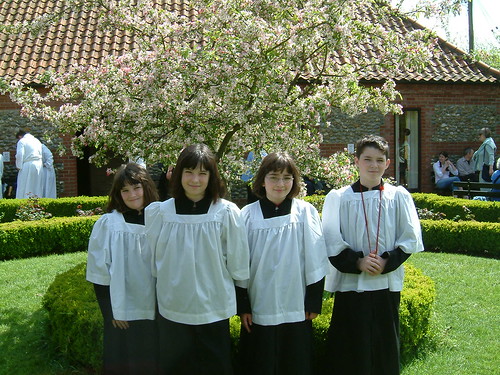
Fortunately, it turned out to be a wonderful day (the forecast was for rain). Here's another shot, with the whole group who attended:

The day ended on the beach. Here's a photo of Liam and Theresa taken by Father Dennis:
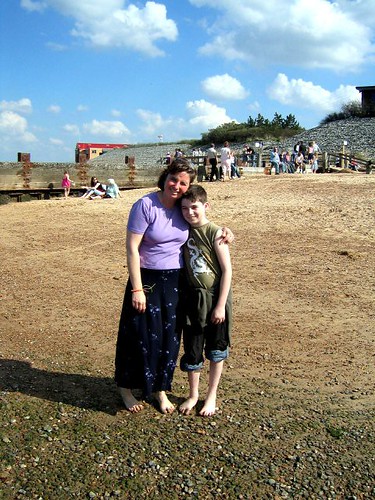

Fortunately, it turned out to be a wonderful day (the forecast was for rain). Here's another shot, with the whole group who attended:

The day ended on the beach. Here's a photo of Liam and Theresa taken by Father Dennis:

EPIC 2014
EPIC 2014
I've only just spotted this, but it apparently has been online for months. It's a "documentary" set in the year 2014 and about the creation of one huge, dominant news site that everyone uses and contributes to. You get exactly the news you want, even if it's mostly rumour and speculation. The New York Times, meanwhile, becomes a paper-only newsletter for the elite and the elderly. The Financial Times yesterday said the film has been viewed by Rupert Murdoch and other media luminaries, and they're scared. So what to do? I noticed that, even in the film, people paid freelance editors to filter the news for them, and presumably do some fact-checking or at least handicap the sources for reliability. That's the ticket. People like the National Enquirer as entertainment and (I believe) watch Fox News as sort of a protest, but at least a signficant portion of the world will still want accurate news. The main issue facing any news organization is that the readership no longer trusts them. They have to win back that trust.
I've only just spotted this, but it apparently has been online for months. It's a "documentary" set in the year 2014 and about the creation of one huge, dominant news site that everyone uses and contributes to. You get exactly the news you want, even if it's mostly rumour and speculation. The New York Times, meanwhile, becomes a paper-only newsletter for the elite and the elderly. The Financial Times yesterday said the film has been viewed by Rupert Murdoch and other media luminaries, and they're scared. So what to do? I noticed that, even in the film, people paid freelance editors to filter the news for them, and presumably do some fact-checking or at least handicap the sources for reliability. That's the ticket. People like the National Enquirer as entertainment and (I believe) watch Fox News as sort of a protest, but at least a signficant portion of the world will still want accurate news. The main issue facing any news organization is that the readership no longer trusts them. They have to win back that trust.
Monday, May 02, 2005
Dan Gillmor on Grassroots Journalism, Etc.: Listening Too Much to the Readers?
Dan Gillmor on Grassroots Journalism, Etc.: Listening Too Much to the Readers?
Dan Gillmor makes a good point, but it's sometimes disheartening to see what attracts people. On a wire service/investment service, we can see exactly what attracts people and what gets read the most. Our 200,000 or so clients are an odd lot -- bankers, primarily, with an average net worth of $1 million. They're interested primarily in how much their peers make, so stories on the salaries of bankers or the fees earned in a particular quarter for mergers and acquisitions advice are always big hitters. But if you really want the hits, put David Beckham or Tiger Woods in your headline...
If popularity rules, then the nature of the community will be what counts if we believe in serious journalism. Attract people who believe what they read in supermarket tabloids and on Fox News, and they'll make decisions in a certain manner. Attract other kinds of folks, and they'll make other kinds of decisions.
Dan Gillmor makes a good point, but it's sometimes disheartening to see what attracts people. On a wire service/investment service, we can see exactly what attracts people and what gets read the most. Our 200,000 or so clients are an odd lot -- bankers, primarily, with an average net worth of $1 million. They're interested primarily in how much their peers make, so stories on the salaries of bankers or the fees earned in a particular quarter for mergers and acquisitions advice are always big hitters. But if you really want the hits, put David Beckham or Tiger Woods in your headline...
New way to set your side-view mirrors
Via Car Talk (which, I'm sad to say, we don't get to listen to in London):
Sounds obvious. So why didn't anyone think of this before? Setting the mirrors this way makes for far smaller blind spots. That's especially useful in the U.K., where drivers make it a habit to either hang out in your blind spot, or change lanes in them. We'll have to make some adjustments in the instructions, though. The driver sits in the right-hand seat here.
For years, we'd been setting our side-view mirrors so that they gave us a view of the back corner of our cars. This is the way it's been done for generations - from grandfather, to father, to us! But we finally discovered something very interesting. The back corner of the car never moves. It always stays in the same exact place. So there's really no reason to keep an eye on it.
Sounds obvious. So why didn't anyone think of this before? Setting the mirrors this way makes for far smaller blind spots. That's especially useful in the U.K., where drivers make it a habit to either hang out in your blind spot, or change lanes in them. We'll have to make some adjustments in the instructions, though. The driver sits in the right-hand seat here.
Economist.com | Sport
Economist.com | Sport: "ONE industry is competitive, globalised and financially self-sufficient. The other is monopolistic, inward-looking and accustomed to handouts from the taxpayer. Now, here's a puzzle. One of these industries is based in America, while the other was founded in northern Britain in the late 19th century. Which is which?"
ongoing � Happy Commie Day
ongoing � Happy Commie Day
My oldest child is way too young to remember the Soviet Union. The wall came down around the time she was born, and she still has a piece of the wall from one of her great uncles who was covering the event for ABC News. But it's funny how some of the ideas remain alive and well. Communism stops working for anything above the village level, and it's debatable if it works even at that level. But it sounds good, especially to teenagers.
My oldest child is way too young to remember the Soviet Union. The wall came down around the time she was born, and she still has a piece of the wall from one of her great uncles who was covering the event for ABC News. But it's funny how some of the ideas remain alive and well. Communism stops working for anything above the village level, and it's debatable if it works even at that level. But it sounds good, especially to teenagers.
Subscribe to:
Comments (Atom)


